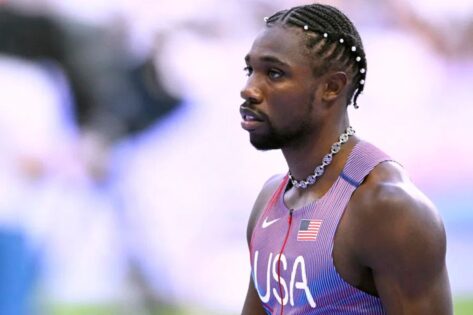Track and field, for all its raw speed and heart-pounding finishes, often feels like the underdog of professional sports when it comes to cash flow. Unlike the NBA or NFL, where multimillion-dollar contracts are flaunted, sprinters and jumpers rely heavily on sponsorships, especially from shoe companies like Nike and Adidas, to make bank.
These deals aren’t just about flashy sneakers, they’re the financial backbone for most athletes chasing Olympic dreams. But how transparent is this game, and who’s really calling the shots? Enter Justin Gatlin, the 2004 Olympic gold medalist, pulling back the curtain on the shoe world’s secretive playbook.
On YouTube channel Coach’s DeskTV, Gatlin dropped a truth bomb about how shoe companies structure deals and why athletes need to know their worth. “They keep the contracts private because it creates division in our sport,” he said. He paints a vivid picture: imagine two top sprinters, both clueless about each other’s deals, assuming the other’s getting a sweeter paycheck. “I’m thinking you’re getting a better deal than me, and you thinking I’m getting a better deal than you—but we both settling on a number,” Gatlin explained.
IMAGO
Behind closed doors, he says, companies like Nike and Adidas coordinate. “I’m gonna sign this guy for 350. Okay, I’m gonna sign this guy for 352.” This secrecy breeds division, not unity, keeping athletes from collectively demanding more. Gatlin’s point is clear: if sprinters shared contract details, they could push for better terms. “We both can say, ‘Nah, up our price,’” he urged. But why does this opacity persist in track and field?
The answer lies in the sport’s unique financial landscape. Unlike team sports, track athletes are solo acts, making sponsorships their lifeline. Gatlin’s insights highlight a power imbalance. Shoe companies hold the cards, leveraging rivalry to keep payouts low. His call for transparency is a rallying cry for athletes to value their performances and negotiate smarter. Could this spark a shift in how track stars approach their deals? Meanwhile, Noah Lyles is also concerned.
Noah Lyles’ fight for legacy and recognition in the Adidas deal
Not only Justin Gatlin but also Noah Lyles has been vocal about the intricate world of shoe contracts, shining a spotlight on his own journey with Adidas. As the reigning sprint king, Lyles secured a landmark deal in 2024, extending his Adidas partnership through the 2028 Los Angeles Olympics. Described as the richest track and field contract since Usain Bolt’s, it underscores Lyles’ status as a six-time world championship medalist. Yet, beneath the glitz, Lyles has been candid about the deal’s complexities, likening it to a “360 deal” that demands more than just racing. What does this mean for a star like Lyles?
Lyles’ contract isn’t just about dollars—it’s a testament to his marketability, with his electrifying performances and vibrant personality. However, he’s been upfront about the challenges, particularly his push for a signature shoe, a rare feat for U.S. track athletes. “I’m trying to get my own shoe, but it’s a fight,” Lyles said in a 2024 interview, highlighting the shoe industry’s hesitance to elevate American sprinters to Bolt-like status. Despite his global fame, Lyles faces hurdles in securing the same iconic branding as his Jamaican predecessor. Why is it so tough for U.S. track stars to break through?
The answer lies in the sport’s niche status in America, where track struggles for mainstream attention. Lyles’ deal, while lucrative, reflects the delicate balance of performance and branding. His advocacy for better recognition could redefine how sprinters negotiate their worth. Will Lyles’ fight pave the way for future stars?
The post Noah Lyles’ Fight for Shoe Deal Continues While Track & Field Legend Exposes Endorsement Reality appeared first on EssentiallySports.
